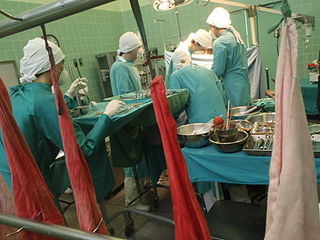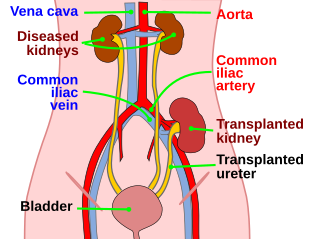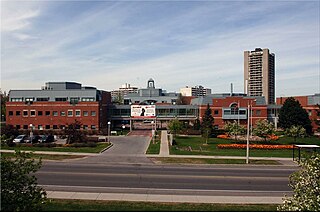Related Research Articles

Organ donation is the process when a person allows an organ of their own to be removed and transplanted to another person, legally, either by consent while the donor is alive or dead with the assent of the next of kin.

Organ transplantation is a medical procedure in which an organ is removed from one body and placed in the body of a recipient, to replace a damaged or missing organ. The donor and recipient may be at the same location, or organs may be transported from a donor site to another location. Organs and/or tissues that are transplanted within the same person's body are called autografts. Transplants that are recently performed between two subjects of the same species are called allografts. Allografts can either be from a living or cadaveric source.

Kidney transplant or renal transplant is the organ transplant of a kidney into a patient with end-stage kidney disease (ESRD). Kidney transplant is typically classified as deceased-donor or living-donor transplantation depending on the source of the donor organ. Living-donor kidney transplants are further characterized as genetically related (living-related) or non-related (living-unrelated) transplants, depending on whether a biological relationship exists between the donor and recipient.

Canadian Blood Services is a non-profit charitable organization that is independent from the Canadian government. The Canadian Blood Services was established as Canada's blood authority in all provinces and territories except for Quebec in 1998. The federal, provincial and territorial governments created the Canadian Blood Services through a memorandum of understanding. Canadian Blood Services is funded mainly through the provincial and territorial governments.
The National Kidney Foundation, Inc. (NKF) is a voluntary health organization in the United States, headquartered in New York City, with over 30 local offices across the country. Its mission is to prevent kidney and urinary tract diseases, improve the health and well-being of individuals and families affected by these diseases, and increase the availability of all organs for transplantation. NKF is the largest, most comprehensive, and longstanding patient-centric organization dedicated to the awareness, prevention and treatment of kidney disease in the United States.

Children's Miracle Network Hospitals is a nonprofit organization that raises funds for children's hospitals in the U.S. and Canada. Donations support the health of 10 million children each year.

The United Network for Organ Sharing (UNOS) is a non-profit, scientific and educational organization that administers the only Organ Procurement and Transplantation Network (OPTN) in the United States, established by the U.S. Congress in 1984 by Gene A. Pierce, founder of United Network for Organ Sharing. Located in Richmond, Virginia, the organization's headquarters are situated near the intersection of Interstate 95 and Interstate 64 in the Virginia BioTechnology Research Park.
The American Kidney Fund (AKF) is a publicly supported non-profit organization founded in 1971.
Organ procurement is a surgical procedure that removes organs or tissues for reuse, typically for organ transplantation.

The National Organ Transplant Act (NOTA) of 1984 is an Act of the United States Congress which established the framework for the U.S. organ transplant system. The act clarified the property rights of human organs from deceased individuals and created a public-private partnership known as the Organ Procurement and Transplantation Network (OPTN), which was empowered to manage organ allocation on a national basis.
Organ trade is the trading of human organs, tissues, or other body products, usually for transplantation. According to the World Health Organization (WHO), organ trade is a commercial transplantation where there is a profit, or transplantations that occur outside of national medical systems. There is a global need or demand for healthy body parts for transplantation, which exceeds the numbers available.
Organ transplantation in Israel has historically been low compared to other Western countries due to a common belief that organ donation is prohibited under Jewish law. This changed with the passage of new organ donation laws in 2008. If two patients have the same medical need, priority will now go to the patient who has signed an organ donor card, or whose family members have donated an organ. This policy was nicknamed don't give, don't get. The law also defines "brain death" as an indication of death for all legal purposes, including organ donation. Additionally the law provides financial reimbursement to living donors for medical expenses due to donation and lost time at work. Organ trafficking is explicitly banned. Health insurance plans can no longer reimburse patients who go abroad to receive transplants.
Israeli–Arab organ donations refers to organ donations in Israel in which the families of Jews and Arabs killed in the Israeli-Arab conflict donate organs to transplant patients on the "opposite side". Examples are Yoni Jesner, a 19-year-old student at Yeshivat Har Etzion in Gush Etzion, and Ahmed Khatib, a Palestinian boy shot by Israeli Defense Forces soldiers who mistook his toy gun for a real one. The generosity of families prepared to donate the organs of their loved ones under such circumstances has been praised. Their story was also made the subject of an award-winning BBC World Service program, Heart and Soul, in 2007.

MOHAN Foundation is a not-for-profit, registered non-government charity organisation in India that works in the field of deceased organ donation and transplantation. MOHAN is an acronym for Multi Organ Harvesting Aid Network. It has offices in Chennai, Hyderabad, Bengaluru, Delhi, Mumbai, Chandigarh, Nagpur, Jaipur and information centers at Kerala and Imphal.
Organ donation is when a person gives their organs after they die to someone in need of new organs. Transplantation is the process of transplanting the organs donated into another person. This process extends the life expectancy of a person suffering from organ failure. The number of patients requiring organ transplants outweighs the number of donor organs available.
The National Kidney Registry (NKR) is a national registry in the United States listing kidney donors and recipients in need of a kidney transplant. NKR facilitates over 450 "Kidney Paired Donation" (KPD) or "Paired Exchange" transplants annually.
Kidney paired donation (KPD), or paired exchange, is an approach to living donor kidney transplantation where patients with incompatible donors swap kidneys to receive a compatible kidney. KPD is used in situations where a potential donor is incompatible. Because better donor HLA and age matching are correlated with lower lifetime mortality and longer lasting kidney transplants, many compatible pairs are also participating in swaps to find better matched kidneys. In the United States, the National Kidney Registry organizes the majority of U.S. KPD transplants, including the largest swaps. The first large swap was a 60 participant chain in 2012 that appeared on the front page of the New York Times and the second, even larger swap, included 70 participants and was completed in 2014. Other KPD programs in the U.S. include the UNOS program, which was launched in 2010 and completed its 100th KPD transplant in 2014, and the Alliance for Paired Donation.
BC Transplant Society (BCTS) founded in 1985 is now an agency of Provincial Health Services Authority (PHSA) in the Canadian province of British Columbia that registers consent to be donors of organs for Organ transplantation.
Organ transplantation in the Indian state of Tamil Nadu is regulated by India's Transplantation of Human Organs Act, 1994 and is facilitated by the Transplant Authority of Tamil Nadu (TRANSTAN) of the Government of Tamil Nadu and several NGOs. Tamil Nadu ranks first in India in deceased organ donation rate at 1.8 per million population, which is seven times higher than the national average.
Organ donation in India is regulated by the Transplantation of Human Organs and Tissues Act, 1994. The law allows both deceased and living donors to donate their organs. It also identifies brain death as a form of death. The National Organ and Tissue Transplant Organisation (NOTTO) functions as the apex body for activities of relating to procurement, allotment and distribution of organs in the country.
References
- ↑ Goodman, Claire (2021-06-23). "Katy girl receives life-saving liver transplant following community donations". Houston Chronicle. Retrieved 2023-01-10.
- ↑ "Thanks to Three Heart Transplants An Arizona Family is Celebrating Valentine's Day and National Donor Day". glendaledailyplanet.com. Retrieved 2023-01-10.
- ↑ Gibson, Robin. "Staying 'Justin Strong': Muncie Central grad awaits a kidney transplant". The Star Press. Retrieved 2023-01-10.
- ↑ "Noblesville family raising money for their infant's kidney transplant". wthr.com. January 17, 2022. Retrieved 2023-01-10.
- ↑ Smith, Rachel. "Organ transplant costs don't end at surgery; system 'not set up for families to succeed'". The Herald-Times. Retrieved 2023-01-10.